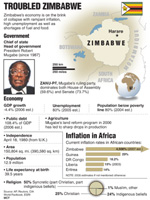 MCT
MCT
Article
As Zimbabwe teeters on the verge of total collapse, millions of lives are at stake—yet there is still hope for this African nation.
Learn the why behind the headlines.
Subscribe to the Real Truth for FREE news and analysis.
Subscribe NowBordering Victoria Falls, one of the seven natural wonders of the world, Zimbabwe has been a tourist destination for decades. In past years, the African nation of 13 million inhabitants has seen numerous news headlines hailing its growth, economy, education, literacy and development.
During the 1970s the country faced a bloody seven-year civil war, after which Robert Mugabe became the nation’s prime minister in 1980. Spirits were high, and the country was proud. That same year, The Plain Truth, predecessor of this magazine, stated that “peace in Zimbabwe is but a lull in a gathering storm.”
Nearly three decades later, that storm has arrived. Millions in this once-thriving land now live under miserable conditions: constant food shortages—runaway inflation—AIDS—political persecution—corruption across all levels—a perfect storm of national suffering and despair.
However, this will ultimately be replaced with economic security, universal prosperity and lasting success. But how?
Before taking a glimpse into Zimbabwe’s wonderful future, let’s first examine the bleak picture of its current condition.
Millions Go Hungry
Once considered the breadbasket of Southern Africa, food shortages are now rampant in Zimbabwe. The World Food Program, the world’s largest humanitarian agency, stated, “The poor harvest coupled with the worsening economic crisis will leave 2.1 million people facing food shortages as early as the third quarter of 2007—a figure that will rise to 4.1 million at the peak of the crisis in the months before the next main harvest in April 2008.”
Grocery store shelves throughout the nation are often bare—and when food supplies become available, chaos usually follows. The Associated Press reported, “…hordes of shoppers desperate to buy sugar amid severe shortages stampeded at a shopping complex in Zimbabwe’s second-largest city, killing a 15-year-old boy and a security guard.”
The article added, “A government order slashing prices of all goods and services by about half in June [2007] has led to acute shortages of bread, meat, gasoline and other basic commodities in Zimbabwe, which is in its worst economic crisis since independence in 1980.”
In an Economist interview, a woman commented that to feed her family, she grows vegetables in her backyard as substitutes for the chicken, eggs and beef she can no longer afford.
A Crumbling Economy
Just a decade ago, Zimbabwe had the second-largest economy in the region.
 MCT
MCTBut today, its economy is collapsing—superinflation has rendered bank notes virtually worthless. For example, toilet paper is more valuable than small Zimbabwean denominations. The government released the new 200,000 Zimbabwe dollar bill—which values one U.S. dollar on the black market—and can only buy one kilogram of sugar! The few who are employed (the national unemployment rate is 80%) earn money that is essentially worthless.
Zimbabwe has the highest inflation in the world. The official rate is 4,500%, but independent estimates are as much as 9,000%-12,000%.
In an attempt to address the problem, the government decided in June 2007 to slash prices, forcing many storekeepers to sell products at a loss. This has contributed to widespread shortages of basic necessities. In some stores, citizens can no longer find items such as bread or meat.
A July 2007 Economist report described Zimbabwe as “an increasingly wretched place and, sadly, [it] will grow more miserable for some time yet…Years of economic collapse, provoked by dreadful misrule, have already taken a huge toll on Zimbabwean lives: The population has been battered by hunger, poverty and AIDS; some three million people are estimated to have fled abroad; life expectancy has dropped to medieval levels.”
Life expectancy among males has decreased from 60 years of age in 1990 to 37 today, with the life expectancy of females now at 34! This is one of the worst rates in the world—it means Zimbabweans live less than half the lifetime of most Westerners!
The Failed States Index, produced by Fund for Peace and Foreign Policy magazine, ranks Zimbabwe as the fourth most failed state in the world, only slightly better than Sudan, Iraq and Somalia. This index charts 12 different social, economic and political measures. In three of these categories, Zimbabwe is the most deplorable and unstable.
Millions of Zimbabweans have fled the country to South Africa. Some estimates have the number at three to four million. Some find jobs in South Africa that pay $142 USD on a monthly basis. This may seem like very little, but this is ten times a teacher’s salary in Zimbabwe!
Because only 20% of the populace is employed, four in five Zimbabweans are jobless.
One must wonder about those who are too poor to leave the country. Where can they go to find enough food for their families? What can they do to survive?
In a native dialect, Zimbabwe means “the great or big house built of stone boulders.” Today, that big house of stone has crumbled to its foundation.
Yet the nation will one day be supported by a greater “house,” with incorruptible foundations—a world-ruling government that will bring economic stability and give all Zimbabweans the tools they need to excel.
Persecution and Human Rights Violations
Political persecution in Zimbabwe is reportedly widespread. The leader of the opposition party was badly beaten in early 2007, sparking anger from the international community. Various human rights organizations report that political opponents are often imprisoned and punished without proper court procedures.
The Human Rights Forum stated that “legal and medical experts documented that cases of state-orchestrated torture on individuals rose to about four per day in the early part of the year” (Associated Press). Other reports, comparing the first half of 2007 to the first half of 2006, claim that gross violations of human rights have doubled.
The Elite Few
Despite the horrific conditions in which the average Zimbabwean lives, the nation’s upper class lives quite comfortably—allegedly “bleeding the economy dry,” according to some in an Economist report.
The elite few—especially those attached to government bureaucracy—enjoy luxurious lives. As one opposition member stated, “The platinum mines can keep the core of the elite living in the manner they’re accustomed to—just in a sea of poverty” (New York Times).
Reportedly, many well-paid legislators think nothing is wrong in their country. There is no need for political change, they claim, because Zimbabwe is a democracy.
Meanwhile, millions of their fellow countrymen continue to suffer, subsisting in abject poverty and fearful uncertainty of what tomorrow will bring.
Why Does God Allow This?
Regarding the establishment of governments and their leaders, the Bible states that “the powers that be are ordained [appointed] of God” (Rom. 13:1). It also states that God “changes the times and the seasons: He removes kings, and sets up kings: He gives wisdom unto the wise, and knowledge to them that know understanding” (Dan. 2:21; see also 4:17, 25).
Why would the Creator allow such governments of men—monarchies, totalitarian states, brutal religious regimes, lascivious democracies—to rise to power? Why would He permit suffering to run rampant among innocent civilians and children? Why doesn’t God intervene?
The answer—which millions of professing believers fail to grasp—is simple: This is not God’s world. For the last 6,000 years of human existence, our Creator has allowed men to do “that which was right in his own eyes” (Judges 21:25). The lasting peace, joy, security, prosperity and sense of purpose that all long for continue to be an unattainable dream because human beings do not know how to govern themselves. Governments of communism, socialism, monarchies, dictatorships and democracies have all failed under the guidance of human hands.
Zimbabwe is no different. In some ways, it is a study in failure.
Widespread Despair
 MCT
MCTZimbabwe’s economy is on the brink of collapse with rampant inflation, high unemployment as well as shortages of fuel and food.
The world today is grim—and the trends, ills and conditions will grow worse. The Bible states that man’s governments, economies, religious and educational systems, and everything that constitutes civilization, belong to “the god of this world” (II Cor. 4:4), who “deceives the whole world” (Rev. 12:9). Called the “prince of the power of the air” (Eph. 2:2), this great being influences the thoughts, attitudes and inner motives of humanity, steering mankind away from the awesome potential the true God intends for all people to achieve.
But the Bible also speaks of a “world to come”—a future age when humanity will no longer be enslaved to misery, hunger and suffering.
Just after Zimbabwe’s current leader was elected, Time magazine reported, “The long election lines at polling stations were filled with proud, determined voters whose sentiments were not hard to guess. ‘They have walked miles to come here,’ said a Rhodesian voting officer in one midlands village. ‘They’re all ages, disabled, crippled, blind. They say straight away who they want.’”
These people had hope, but it was dashed—destroyed. As one journalist in Zimbabwe said, “[The nation] has now become a monumental museum of failure. The air is fraught with frustration, with anger, with despair, and some people have just given up” (Frontline).
A Renewed Purpose
An awesome future lies just ahead for Zimbabwe—and for all nations. The following excerpts are from the book Tomorrow’s Wonderful World – An Inside View!, written by David C. Pack, publisher and editor-in-chief of The Real Truth:
Perfect Government: “The Bible is almost entirely a message about a coming world government. Everywhere Christ went, He preached—announced—the coming of the kingdom of God. He explained that it would be a world-ruling government that would smash and replace all the governments of men. He brought exciting, thrilling good news, in advance of its arrival. He spoke of a utopian, wonderful world tomorrow—now imminent—explaining how many would qualify to rule with Him.”
Economy: “To survive in today’s hostile world, governments must collect exorbitant rates of taxation to finance military forces and expanded law enforcement personnel. Of course, greed on the part of many government leaders accounts for much of the excess taxation that is now so burdensome to so many. As governments expand, they tend to extract more in taxes as a means to redistribute wealth, pursuing the socialistic philosophies that predominate in this world. Outrageous tax rates will be eliminated.
“The administration of God’s government has costs, however. Rather than tax rates ranging from 30 to 90 percent, a tithe—just 10 percent!—will be required. That 10 percent belongs to God (Lev. 27:30). God views this command most seriously: ‘Will a man rob God? Yet you have robbed Me. But you say, Wherein have we robbed You? In tithes and offerings. You are cursed with a curse: for you have robbed Me, even this whole nation. Bring you all the tithes into the storehouse, that there may be meat in Mine house, and prove Me now herewith, says the Lord of hosts, if I will not open you the windows of heaven, and pour you out a blessing, that there shall not be room enough to receive it’ (Mal. 3:8-10).
“Most nations have a variety of heavy, burdensome, hidden taxes, and national health and social security services. Ever-mounting taxes become overwhelming to many now struggling to survive. These burdens will be lifted in tomorrow’s world.”
Health: “In tomorrow’s world, people will be universally taught that ‘sin is the transgression of the law’ (I John 3:4). We have discussed God’s great spiritual laws, but He has numerous physical laws as well. Mankind has specialized in how to break them all. He is surrounded, therefore, by every kind of bad physical effect. Rampant disease and illness are among the greatest.
“Savor God’s promise regarding the disappearance of disease and sickness in the world tomorrow and what makes this possible: ‘But there the glorious Lord will be unto us a place of broad rivers and streams; wherein shall go no galley with oars, neither shall gallant ship pass thereby. For the Lord is our Judge, the Lord is our Lawgiver, the Lord is our King; He will save us…And the inhabitant shall not say, I am sick: the people that dwell therein shall be forgiven their iniquity’ (Isa. 33:21-22, 24).”
“This is what God wants: ‘For I will restore health unto you, and I will heal you of your wounds’ (Jer. 30:17).”
“When fully implemented, the government of God will be a picture of harmony and unity, with all those in administration being the right choice for each job—perfectly qualified for the tasks they face.”
“Through proper re-education of the world, God’s laws of health will become known—and compliance with them will become practical and affordable.”
Cities of Tomorrow: “City planners of the future will always be certain to allow enough room for people to enjoy their homes and the land around them. But the planning of this world’s cities has been much different. Overpopulation has translated into overcrowding, with tenement houses teeming with too many people for the space allotted. Row houses are common in many big cities of the world. God says, ‘Woe unto them that join house to house, that lay field to field, till there be no place…’ (Isa. 5:8). Many of today’s cities are better off temporarily becoming waste places. It will be far easier to rebuild them from scratch.
“The cities of the world to come will present a far different—and infinitely better and more beautiful—picture than the cities of today.”
Education: “Life is a process of education—learning to develop character by obedience to God’s laws, which in turn yields every good, fulfilling and favorable result. Education in the world tomorrow will explain how to live—and how to learn a productive trade. Of course, all academic subjects, including wholesome art and music, will produce well-rounded people. Life will become invigorating, exciting and fulfilling.
“Imagine how important world history will be in the classrooms of tomorrow. Everyone will be forced to view the truth of history through the eyes of God, instead of through the revisionist propaganda of each nation’s historians—including their dishonest version of world history, written according to how they need to portray it. No one will be allowed to forget how, and how long, the world was off track from God’s laws and ways.
“All error will be exposed for what it is. The truth of every matter—in every field of knowledge—will be taught in place of error. This will not be easy to do with everyone. Many will have been steeped in the false knowledge of this world’s values. These will be deeply ingrained. Man-made definitions of political correctness, situation ethics, human rights, discrimination, alternative lifestyles and proper education will have to be scrapped and replaced with God’s definitions. Some describe the Bible as “violent” or “hate literature.” Many believe this—and they will have to unlearn it, forcibly if necessary.
“The facts of why things happen a certain way will be taught in a straightforward fashion. No punches will be pulled. For instance, mankind will be taught exactly why war occurs, from God’s perspective. Consider this from the book of James: ‘From where come wars and fightings among you?’ (4:1). The question is direct. So is God’s answer: ‘Come they not hence, even of your lusts that war in your members? You lust, and have not: you kill, and desire to have, and cannot obtain: you fight and war, yet you have not, because you ask not. You ask, and receive not, because you ask amiss, that you may consume it upon your lusts’ (vs. 1-3). And verse 5 adds, ‘Do you think that the scripture says in vain, The spirit that dwells in us lusts to envy?’
“Plain, simple answers like these will be given in classrooms around the world. Gone will be vague, blurred, philosophical opinions lacking the absolutes of God’s Law and His explanations. But try to tell today’s generals, soldiers and military planners such unvarnished truth about why they go to war and kill. They will ridicule your suggestion as so much unrealistic, childish idealism.
“Re-educating the world will be a truly monumental task. The difficult job of teaching people to learn can only be done if teachers are un-handcuffed and allowed to bring proper discipline and order to schools and classrooms, now so out of control.”
Population and Environment: “God has a Master Plan! No man could ever think of it, or bring it to pass if he did. Yet it will solve every problem related to overpopulation, pollution, and production, procurement and distribution of food and water. It will involve a complete change in entire weather patterns around the earth, including ocean currents, jet streams and flow of arctic air. Beautiful, clear water will be available—and in abundance—in all parts of the world. The nature of mountain ranges, islands and even placement of continents will allow a repopulation of earth simply inconceivable to modern planners of cities and nations.”
Internal Peace and Security: “The streets of cities around the world will soon be safe for all. Look at this description of how Jerusalem, certainly one of the most violent, unsafe cities on earth today, will change: ‘There shall yet old men and old women dwell in the streets of Jerusalem, and every man with his staff in his hand for very age. And the streets of the city shall be full of boys and girls playing in the streets thereof’ (Zech. 8:4-5). Abandoned buildings, choking traffic, drug dealers, the homeless, street gangs, criminals—and all fear!—will soon only be memories.”
Though the current situation for Zimbabweans is dire, hope remains. Man cannot solve his ever-growing problems, but his Creator can—and will! Today’s governments and their imperfect economies, educational systems and societies will soon be replaced by a perfect world-ruling supergovernment—the kingdom of God!
More on Related Topics:
- Libya’s Instability Will Worsen Further Without a Unified Government and Elections, UN Envoy Says
- U.S. Warns a Famine in Sudan Is on Pace to Be the Deadliest in Decades as the World Looks Elsewhere
- U.S. Hands Over Its Last Military Base in Niger to the Ruling Junta
- Rights Group Says Sexual Violence Is Rampant in Sudan’s Conflict
- 755,000 People at Risk of Famine in Coming Months in War-torn Sudan, Experts Warn



